The next three days mark our final MARL Seminar before graduation. It’s a little surreal as we’ve bonded and spent valuable time getting to know each other both personally and professionally over the past 20 months. MARL Class XII traveled from various areas throughout the state to gather in southern Minnesota in Austin, also known as SPAM Town USA. Our three days together did not disappoint as we were able to spend time learning what makes Austin such a unique community. The theme for this seminar is “leading innovation and change”.
We began our seminar by spending lunch in the conference room of our hotel hearing from John Garry, who is the President and CEO for Development Corp. of Austin. As part of his role, he works with public and private organizations to help existing businesses grow as well as attract new businesses to the Austin area. Austin has a population of ~26,000 people and employs 12,000 people. John explained that Mower County is a leading county in MN for soy, corn and hogs and agriculture and bio-science are two of its biggest industries. When asked what types of things people do for recreation in Austin, John explained that there is an arts festival and that is a premiere event for Austin. Music is also something big for the area as is mountain biking, but he joked without the mountains or hills.
Austin is home to Hormel Foods, Hormel Institute and the Hormel Foundation, which drive the economy. John stated that the Hormel Foundation, which holds ~48% of Hormel Foods stock, gives back millions of dollars to Austin and other businesses within Mower County. Hormel Institute is a research facility that focuses much of its work on cancer research. Hormel Foods, a Fortune 500 company known for its pork products like bacon and ham, also has other brands like Skippy, Jennie-O, Chi-Chi’s, Planters and many others.
Something that Austin may not be known for, yet, will be a new research center, called The Future of Advanced Agricultural Research in Minnesota (FAARM). This will be a $220M 1,300 acre research facility in northwestern Mower County that is a joint effort between the U of M, Riverland Community College and the Hormel Foundation. FAARM is in the early stages, but the Hormel Foundation has already pledged $60M and this will be a state-of-the-art dairy, poultry, swine and beef facility where industry and education can come together and perform research.
After that introduction to the Austin community, we spent time discussing how change is constant in our lives, but can be unsettling for some. We went through exercises and activities that better help us think about our own reactions to change, which can be detrimental to others while being in a leadership role. We examined the stages of change so that we may take that into consideration as we work with others and consider how people can deal with change. Similar to the adoption lifecycle scale for a new product, the same scale exists for how people adapt to change where some latch onto it right away while others take longer to jump onboard. Thank you Toby for sharing his expertise with us on this topic, including some fun activities like building a spaghetti tower, with some unanticipated changes that were introduced to us amidst the design and building process.
After getting an overview of Austin, we took a short drive to downtown Austin to the SPAM Museum, where we had a private gathering to end our day. We were met by leadership from Hormel Foods as well as MARL Alumni. Jeff Grev, VP of Legislative Affairs of Hormel Foods, did a welcome and we enjoyed visiting with each other and walking through the gift shop and SPAM Museum while learning about its history. Hormel Foods treated us to some wonderful appetizers and beverages and then we were offered a tour of the museum. Here are some fun facts about SPAM: 1. SPAM products are sold in 44 countries around the world. 2. Guam consumes an annual average of 16 cans per person. 3. SPAM is made from six simple ingredients. 4. There are over 10 SPAM varieties. 5. SPAM products were first introduced in 1937. 6. The SPAM JAM Festival is one of Hawaii’s largest festivals every year. 7. Hawaii consumes more SPAM than any other state – more than 8M cans each year.
We had a wonderful first day in Austin and thanks to John, Jeff and others on the Hormel Foods team for the hospitality!
Day 2_ Exploring the Flavors of Austin: A Journey Through Food Innovation
On the first day of our adventure in Austin, Minnesota, we embarked on a journey that left us feeling like wide-eyed kids in a candy store. But instead of candies, we were immersed in the savory world of Spam at the Spam Museum. The tour was nothing short of eye-opening as we delved into the rich history of Spam and its significance, particularly during World War II. Who knew that a humble canned meat product could hold such historical value and global importance?
After our insightful tour at the Spam Museum yesterday, on Day 2 we shifted gears and ventured into the heart of food production at Hormel Foods and QPP Plants. The magnitude of operations at Hormel left us in awe, especially learning about the sheer number of hogs processed to provide us with the pork products we enjoy daily. It was a testament to the impressive scale of Hormel as a company and the dedication of its workforce.
As we explored Riverland Community College, we had the privilege of engaging with Dr. Okechukwu Ukaga and Mr. Nick Schiltz, gaining valuable insights into food and agriculture education. Transitioning to the Hormel Institute, we were treated to a delicious lunch and a thought-provoking discussion on innovation and change.
Our day concluded with an exciting scavenger hunt around Austin, where we explored iconic landmarks and hidden gems, soaking in the vibrant culture of the city. The evening was filled with reflections from the Austin community and captivating presentations on the remaining Shark Tank Capstone Projects.
As we retreated to the hotel, our minds buzzed with newfound knowledge and appreciation for the intricate workings of the food industry. Day 2 was a testament to the remarkable innovation and dedication that fuels Austin’s thriving food community, leaving us inspired and eager for more adventures ahead.
Day 3_Unveiling Excellence: A Journey Through Akkerman, Inc.
Day 3 of our exploration in Austin, Minnesota, led us to the doorstep of Akkerman, Inc., where we were greeted with anticipation and a sense of curiosity we embarked on a day filled with learning, reflection, and admiration for the remarkable legacy of Akkerman.
Founded in 1973, Akkerman, Inc. has been at the forefront of innovation in the construction industry for nearly five decades. Their industry-leading equipment has empowered contractors worldwide to efficiently install water and sewer lines, along with various other infrastructure projects, in a cost-effective manner.
As we embarked on the Akkerman, Inc. tour, led by President Justin Akkerman himself, we were captivated by the intricate machinery and cutting-edge technology that drives the company’s operations. It was evident that excellence is not just a goal but a way of life at Akkerman, Inc., as they continue to uphold their commitment to delivering superior solutions to their customers.
Following the tour, we engaged in reflections on leadership and its applications, drawing inspiration from the principles of excellence embodied by Akkerman, Inc. Our departure was marked by a profound appreciation for the dedication and ingenuity that have propelled Akkerman, Inc. to its current position in the construction industry. As we bid farewell to Akkerman, Inc., we carried with us a newfound appreciation for the importance of excellence in every aspect of our endeavors.
Nathan & Maria blogging for Seminar Mgmt Team-Yellow (Maria Kalyvaki, Kevin Kruize, Kristy Mach, Scott Schoper and Nathan Hanel)

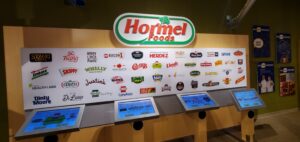
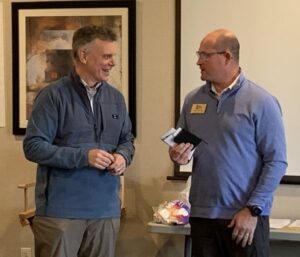
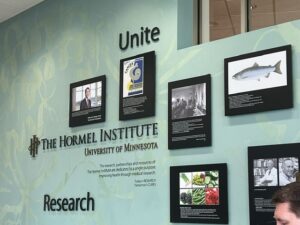
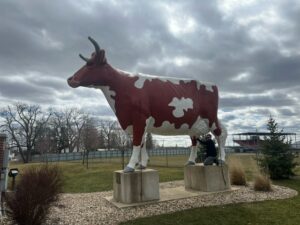
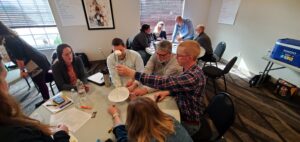
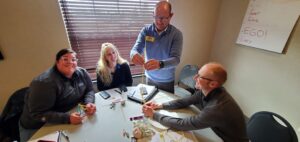
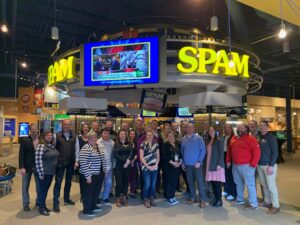
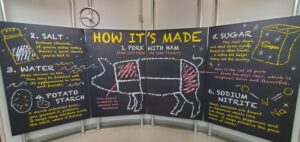
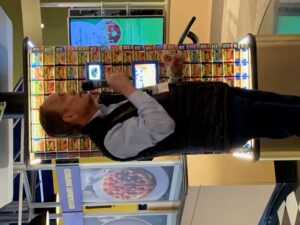
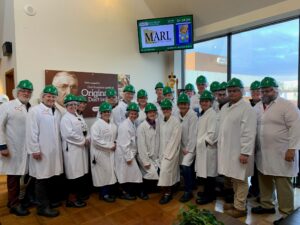
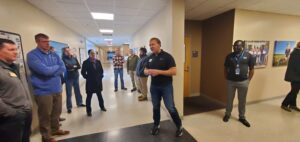

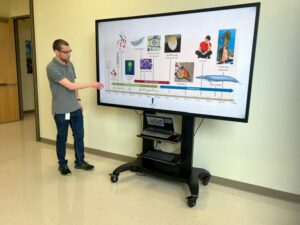
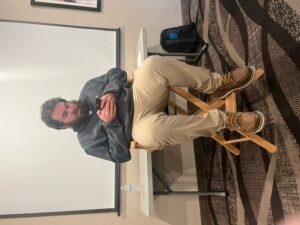
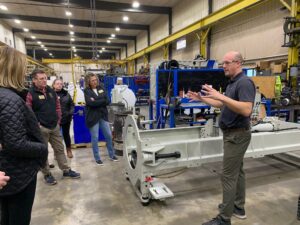
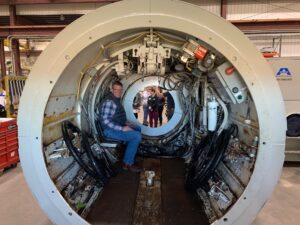
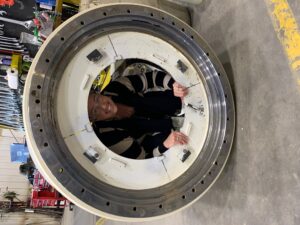

Comments